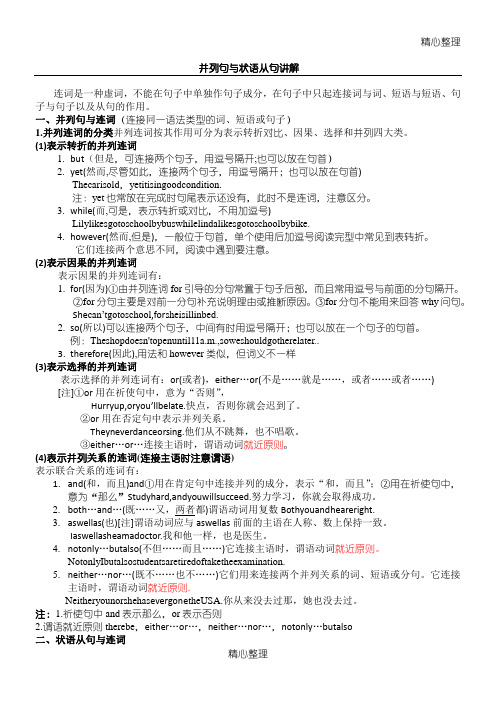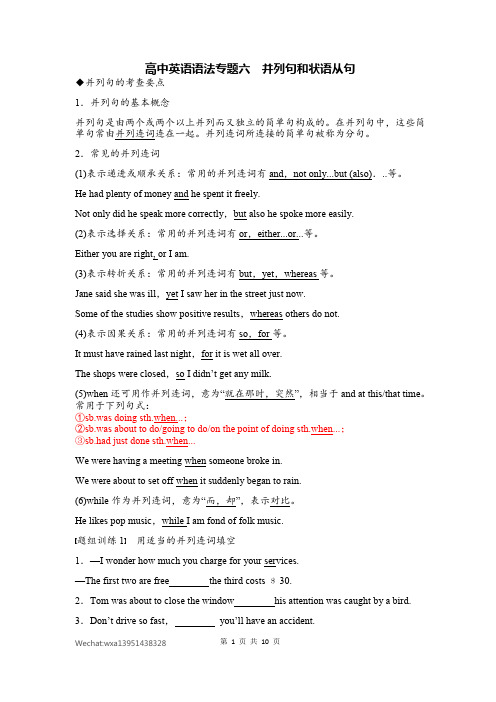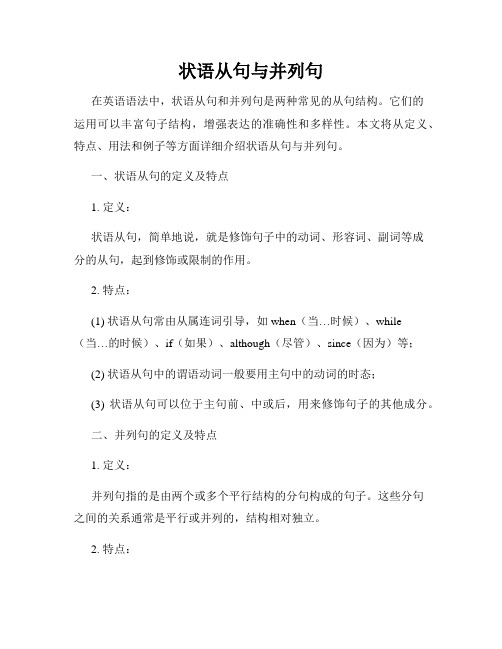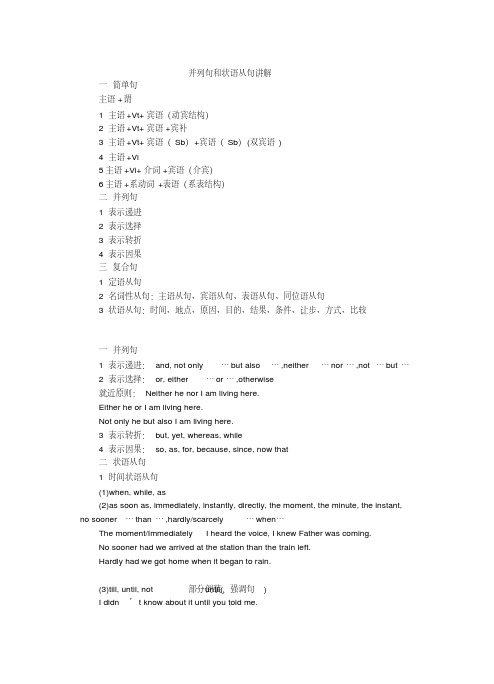高中英语语法:并列句和状语从句
高考必考语法:并列句与状语从句

高考必考语法:并列句与状语从句一、并列句(一) 并列连词①They come from the same country,and they are good friends.②I was glad to meet Jenny again,but I didn't want to spend all day with her.(2013·新课标卷Ⅱ)③It must have rained last night,for it is wet all over.④Yesterday, I forgot to pick my daughter up, so she waited in the kindergarten for nearly two hours.⑤Would you like to leave or would you like to stay? 规律总结:1.表示并列、顺承关系的并列连词有and。
2. 表示转折关系常用的并列连词有but, yet(然而), whereas(然而,但是), while(然而)等。
3.表示因果关系的并列连词有for, so等。
4.表示选择关系常用的并列连词有or, either ... or ..., not ... but, neither ... nor ...等。
(二) 祈使句+and/or/otherwise句式①Work hard and you will succeed.=If you work hard, you will succeed.②Hurry up or we will be late.=If you don't hurry up, we will be late.③A few more efforts and you will succeed.=If you make a few more efforts, you will succeed.规律总结:1.祈使句+and+陈述句=If ...,+主句。
高考英语考点汇总并列句和状语从句

并列句和状语从句一、并列连词1.表示并列关系的连词:and: 可用来连接两个或两个以上的单词/短语或句子,表示一种顺接的关系。
☞He helps me and I help him. 他帮我,我帮他。
both…and:"两个都……",连接两个并列主语时谓语动词用复数。
☞Both Li Ping and Mary are going to the Great Wall tomorrow.neither…nor: "既不……也不……",连接的并列成分可在句中作主语、表语、宾语等。
连接并列成分作主语时,谓语动词通常与nor后的部分保持一致。
☞Neither he nor I am right.not only…but also: "不仅……而且……",强调后者;引导并列主语时,谓语动词与后面的主语保持一致。
☞Not only the students but also the teacher gives the money to our school.2. 表示选择关系的连词:or:用于否定句中连接并列成分,表示"和,与";用于"祈使句+or+陈述句"中,意为"否则,要不然"。
☞The baby is too young. He can’t speak or walk.either…or…:"要么……要么",连接的并列成分可在句中作主语、表语、宾语等。
连接并列成分作主语时,谓语动词通常与or后的部分保持一致。
☞Either Tom is ing or his sisters are. 不是汤姆就是她的姐妹们要来。
3. 表示转折关系的并列连词4. 表示因果关系的并列连词for :so : 4. when 可作并列连词,意为“正在这时”,表示某件事正在发生或刚刚发生时,突然发生另一动作。
⎩⎪⎨⎪⎧ be about to do...when...be doing...when...be on the point of doing...when...had just done...when...☞Tom was about to close the window when his attention was caught by a bird.汤姆正要关窗户,这时他的注意力被一只鸟吸引住了。
并列句与状语从句讲解

精心整理精心整理并列句与状语从句讲解连词是一种虚词,不能在句子中单独作句子成分,在句子中只起连接词与词、短语与短语、句子与句子以及从句的作用。
一、并列句与连词(连接同一语法类型的词、短语或句子)1.并列连词的分类并列连词按其作用可分为表示转折对比、因果、选择和并列四大类。
(1)表示转折的并列连词1. but (但是,可连接两个句子,用逗号隔开;也可以放在句首)2. yet(然而,尽管如此,连接两个句子,用逗号隔开;也可以放在句首)Thecarisold ,yetitisingoodcondition.注:yet 也常放在完成时句尾表示还没有,此时不是连词,注意区分。
3. while(而,4. however(然而,但是)它们连接两个意思不同(2)表示因果的并列连词表示因果的并列连词有:1. for(因为)①由并列连词for ②for why 问句。
She can ’tgotoschool ,for2. so(所以) 例:3. therefore(因此),用法和(3)表示选择的并列连词表示选择的并列连词有:or(不是……就是……,或者……或者……)[注]①or Hurryup,oryou ’②他们从不跳舞,也不唱歌。
③就近原则。
(4)表示并列)1. and(;②用在祈使句中,努力学习,你就会取得成功。
2. both …and …(既……又,两者都)谓语动词用复数Bothyouandheareright.3. aswellas(也)[注]谓语动词应与aswellas 前面的主语在人称、数上保持一致。
Iaswellasheamadoctor.我和他一样,也是医生。
4. notonly …butalso(不但……而且……)它连接主语时,谓语动词就近原则。
NotonlyIbutalsostudentsaretiredoftaketheexamination.5. neither …nor …(既不……也不……)它们用来连接两个并列关系的词、短语或分句。
06高中英语语法专题 并列句和状语从句

高中英语语法专题六并列句和状语从句◆并列句的考查要点1.并列句的基本概念并列句是由两个或两个以上并列而又独立的简单句构成的。
在并列句中,这些简单句常由并列连词连在一起。
并列连词所连接的简单句被称为分句。
2.常见的并列连词(1)表示递进或顺承关系:常用的并列连词有and,not only...but (also)...等。
He had plenty of money and he spent it freely.Not only did he speak more correctly,but also he spoke more easily.(2)表示选择关系:常用的并列连词有or,either...or...等。
Either you are right, or I am.(3)表示转折关系:常用的并列连词有but,yet,whereas等。
Jane said she was ill,yet I saw her in the street just now.Some of the studies show positive results,whereas others do not.(4)表示因果关系:常用的并列连词有so,for等。
It must have rained last night,for it is wet all over.The shops were closed,so I didn’t get any milk.(5)when还可用作并列连词,意为“就在那时,突然”,相当于and at this/that time。
常用于下列句式:①sb.was doing sth.when...;②sb.was about to do/going to do/on the point of doing sth.when...;③sb.had just done sth.when...We were having a meeting when someone broke in.We were about to set off when it suddenly began to rain.(6)while作为并列连词,意为“而,却”,表示对比。
状语从句与并列句

状语从句与并列句在英语语法中,状语从句和并列句是两种常见的从句结构。
它们的运用可以丰富句子结构,增强表达的准确性和多样性。
本文将从定义、特点、用法和例子等方面详细介绍状语从句与并列句。
一、状语从句的定义及特点1. 定义:状语从句,简单地说,就是修饰句子中的动词、形容词、副词等成分的从句,起到修饰或限制的作用。
2. 特点:(1) 状语从句常由从属连词引导,如when(当…时候)、while (当…的时候)、if(如果)、although(尽管)、since(因为)等;(2) 状语从句中的谓语动词一般要用主句中的动词的时态;(3) 状语从句可以位于主句前、中或后,用来修饰句子的其他成分。
二、并列句的定义及特点1. 定义:并列句指的是由两个或多个平行结构的分句构成的句子。
这些分句之间的关系通常是平行或并列的,结构相对独立。
2. 特点:(1) 并列句中的分句之间一般用逗号或并列连词连接,如and(和)、but(但是)、or(或者)等;(2) 并列句中的分句通常要保持结构平行,包括时态、语态、语气等方面的平行。
三、状语从句的用法及例子1. 时间状语从句:时间状语从句用来表示动作发生的时间,常由when、while、before、after、since等引导。
例子:- I will call you when I arrive at the airport.(当我到达机场时,我会给你打电话。
)- She was watching TV while her mother was cooking.(她妈妈在做饭的时候,她在看电视。
)2. 条件状语从句:条件状语从句用来表示主句动作发生的条件,常由if、unless、on condition that等引导。
例子:- If it rains tomorrow, we will stay at home.(如果明天下雨,我们会待在家里。
)- You can go outside unless it is too cold.(除非天气太冷,你可以出去玩。
(完整版)并列句和状语从句讲解

重要的连词辨析 1 as 做连词,引导时间、让步、方式、原因和定语从句 He hurried home, looking behind as he went. (时间) You will grow wiser as you grow older. (时间) Fail as I might, I still want to attempt it. (让步) Child as he is, he can lift such a heavy box. (让步) Little as he is, he can lift such a heavy box. (让步)
the’y ctaangre’e tthbaet solved.
Some men are rich, while others are poor.
状语从句中的倒装
Not only did he speak more correctly, but also he spoke more easily.
Neither does he work hard, nor does his brother.
Such a clever student was he that he was able to work out all the problems.
though 连词 “虽然 ”让步状语从句
Though it was raining hard, yet they went on playing football.
4 地点状语从句
Where, wherever, everywhere, nowhere
5 方式状语从句
as, as if, as though
6 结果状语从句
(1)so that, so
并列句和状语从句
第九讲并列句和状语从句一、并列连词和并列句常见并列连词温馨提示customer,and you should act like one.然而,如果你经常性地使用这个地方的洗手间,那么你就是一个顾客,并且你应该做出顾客的样子。
②(2014·高考湖南卷)She would start either at the front or the back of the classroom and work toward the other end.她不是从教室的前面,就是从教室的后面开始提问,直到另一头。
③(2014·高考大纲全国卷)That family not only restored the important documents to us that day but also restored our faith and trust in people.那个家庭在那天不仅归还了我们那份重要的文档,还让我们重新拥有了对人的信心和信任。
④(2013·高考新课标全国卷Ⅱ)I was glad to meet Jenny again,but I didn’t want to spend all day with her.很高兴又见到Jenny了,但是我不想花一整天时间和她在一起。
⑤(2015·苏州高三模拟)Yesterday,I forgot to pick my son up,so he waited in the kindergarten for nearly two hours.昨天我忘记去接我的儿子了,因此他在幼儿园等了几乎两个小时。
⑥At school,some students are active while some are shy,yet they can be good friends with one another.在学校,有些学生是活跃的而有些学生是害羞的,但是他们可以成为彼此的好朋友。
语法并列句和状语从句
第12讲并列句和状语从句两个或两个以上的简单句用并列连词连在一起构成的句子叫做并列句,其基本结构是“简单句+并列连词+简单句”。
并列连词有:and, but, or, so等。
状语从句是在句子中起副词作用的句子。
根据状语从句在句中不同的作用可分为:时间、地点、原因、目的、结果、条件、方式、让步和比较状语从句。
并列连词和从属连词是高考的重要考点之一,在语法填空中通常以无提示词的方式进行考查,在短文改错中主要考查并列连词和从属连词的误用。
并列句和状语从句的考点如下:核心考点01考查并列连词并列连词是用来连接两个或多个并列的词、短语或句子的词,主要表示并列、选择、转折、因果等关系。
并列连词在句子中位置比较固定,必须位于所连接的并列单位之间;两个并列连词不能并用。
1.表示并列关系的连词表示并列关系的连词有and, both...and...,not only...but also...,neither...nor...等。
2.表示选择关系的连词表示选择关系的连词有or, either...or...等。
3.表示转折关系的连词表示转折关系的连词有but, yet, while等。
4.表示因果关系的连词表示因果关系的连词有for,so。
We listened eagerly, for he brought news of our families.5.when作并列连词的用法when除了作从属连词,引导时间状语从句外,还可作并列连词,其意义为“这时,那时”,相当于and at this/that time。
常用于下列句式:①sb. was doing sth. when...②sb. was about to/going to do sth. when...③sb. was on the point of doing sth. when...④sb. had just done sth. when...。
如:We were having a meeting when someone broke in.我们正在开会,这时有人闯了进来。
高考必备语法——并列句和状语从句
专题3并列句和状语从句一、并列句并列句由两个或两个以上并列而又独立的简单句构成。
在并列句中,这些简单句常由并列连词(短语)连在一起。
注意:when可用作并列连词,相当于and at this/that time,意为“正在这/那时;突然”,常用于下列句式:sb.be about to do/going to do/on the point of doing sth.when...(某人正要做某事,突然……);sb.be doing sth.when ...(某人正在做某事,突然……);sb.had just done sth.when ...(某人刚做完某事,突然……)。
He was about to go out when the telephone rang.他正要出去,电话铃突然响了。
He had just finished writing a report when the boss let him type a letter.他刚写完一篇报告,老板就让他打印一封信件。
单句语法填空1.At school,some students are active while some are shy,yet they can be good friends with one another.2.The other day I was doing some grocery shopping when a man walked toward a group of us at the checkout stand.3.Follow your doctor’s advice,or your cough will get worse.4.John plays basketball well,but/yet his favorite sport is badminton.二、状语从句考点一让步状语从句单句语法填空1.The athletes,especially the winners,should remain modest whatever rapid progress they have made.2.Much as/though I have traveled,I have never seen anyone who’s as capable as John. 3.Don’t trust him,no matter what he says.4.While/Although/Though I admit that there are problems,I don’t agree that they cannot be solved. 5.I’ll do it,even if/though it takes me all the afternoon.6.We’ll go on with the work,whether we can find the necessary tools or not.7.No matter how hard the work is,you’d better try to do it well.考点二时间状语从句单句语法填空1.Not until we succeed in letting wildlife live in peace can we smile in relief.2.Air pollution is getting more and more serious,so we must take action before it is too late. 3.He had no sooner finished his speech than the students started cheering.4.While watching TV,children do not merely absorb words and images.5.As he grew older,he became less active.。
状语从句与并列句
状语从句与并列句状语从句(Adverbial Clause)和并列句(Compound Sentence)是语法中的两种常见句子结构。
它们不仅具有不同的特点,而且在句子中扮演了不同的语法角色。
本文将详细介绍状语从句和并列句的定义、特点和使用方法。
状语从句的特点状语从句是一个从属从句,它用来修饰主句中的动词、形容词或副词,并提供了更多的背景信息或条件。
状语从句通常由连词引导,比如when(当),while(当...时),if(如果),although(尽管)等。
下面是一些例句:1. When I arrived home, it started to rain.(当我到家的时候,开始下雨。
)2. Although she was tired, she continued working.(尽管她很累,她还是继续工作。
)3. If you study hard, you will pass the exam.(如果你努力学习,你会通过考试。
)可以看出,这些状语从句提供了额外的信息,使得整个句子更加完整、具体。
并列句的特点并列句是由两个或多个独立的子句组成的句子,这些子句平等地并列在一起,通过逗号、分号或者连词来连接。
并列句的结构如下:[独立子句1],[连词] [独立子句2]。
常见的并列连词有and(和)、but(但是)、or(或者)等。
下面是一些例句:1. I like playing basketball, and my sister likes playing tennis.(我喜欢打篮球,我姐姐喜欢打网球。
)2. It was raining heavily; therefore, we decided to stay at home.(雨下得很大,所以我们决定呆在家里。
)3. You can either come with us, or you can stay here.(你可以跟我们一起去,也可以留在这里。
- 1、下载文档前请自行甄别文档内容的完整性,平台不提供额外的编辑、内容补充、找答案等附加服务。
- 2、"仅部分预览"的文档,不可在线预览部分如存在完整性等问题,可反馈申请退款(可完整预览的文档不适用该条件!)。
- 3、如文档侵犯您的权益,请联系客服反馈,我们会尽快为您处理(人工客服工作时间:9:00-18:30)。
高中英语语法:并列句和状语从句常见的并列连词1. and和or◆and的用法如下:(1) 表示另加:其意为“和”“又”“而且”。
如:☞Let me have some toasts and a cup of coffee. 给我来几片烤面包和一杯咖啡。
(2) 表示结果:意为“因此”,与so的用法比较接近。
如:☞He fell heavily and broke his arm. 他摔得很重,手臂都摔断了。
(3) 表示条件:相当于if…then,含有“如果……那么……”的意味。
如:☞Do that again and I’ll call a policeman. 你再这样做我就要叫警察了。
(4) 表示连续:既可表示一种连续不断的状态,也可以表示一个动作完成之后连续做另一个动作。
如:☞The train ran faster and faster. 火车开得越来越快。
☞He finished lunch and went shopping. 他吃完午饭而后去买东西。
(5) 表示对比:含有“尽管……还”的意味。
如:☞Tom’s 15 and still sucks his thumb. 汤姆15岁了,还嘬大拇指。
◆并列连词or要比and用法简单此,它主要表示选择,其意为“或”“还是”等。
如:☞It’s a lovely baby. Is it a boy or a girl? 宝宝真可爱,是男孩还是女孩?☞He speaks French, or perhaps he understands it. 他会讲法语,或者他懂法语。
另外,or还可以表示一种否定的条件,相当于if…not…如:◆Be careful, or you’ll break that vase! 小心,否则你会把那花瓶打碎。
=If you don’t be careful, you’ll break that vase.2. 表对比或转折的连词主要有but和yet(1) but的用法:其意为“但”“但是”“却”。
如:☞He looked around but could see nobody. 他向四周望望,却没看见什么人。
☞I know of the town but I’ve never been there. 我知道有这座城市,但从未去过。
(2) yet的用法:其意也表示“但是”“却”,与but用法相似,有时可换。
如:☞It is strange yet true. 这很奇怪,却是真实的。
☞I have failed, yet I shall try again. 我失败了,但我还要尝试。
3. 表因果关系连词主要有for和so(1) for的用法:表示原因,意为“因为”“由于”。
如:☞The days were short, for it was now December. 白天很短,因为现在已经是12月。
注意:for表示原因时,它引出的句子不能放在句首,如不能说:For it was now December, the days were short.(2) so的用法:表示结果,意为“所以”“因此”。
如:☞It’s very cold, so wear a heavy coat. 外边很冷,因此穿一件厚大衣吧。
注意:汉语可以说“因为……所以……”,但英语中表示结果的so不能与表示原因的because连用,如不能说:Because it’s very cold, so wear a heavy coat.4. 其他并列连词除上面提到的并列连词外,还有both…and, either…or, neither...nor, not only...but also等并列连词。
如:(1) both…and的用法:意思是“不仅……而且”“……和……”。
如:☞He speaks both English and French. 他既说英语也说法语。
☞Both brother and sister are college students. 兄妹俩都是大学生。
(2) either…or的用法:意思是“要么……要么”“……或是……”。
如:☞We can have either fish or beef. 我们可以吃鱼或是牛肉。
☞We can either fly there or go by train. 我们可以坐飞机去也可坐火车去。
(3) neither...nor的用法:意思是“既不……也不”。
如:☞He neither drinks nor smokes. 他既不喝酒,也不抽烟。
☞She felt neither frightened nor sorry. 她既不感到害怕也不感到遗憾。
(4) not only...but also的用法:意思是“不仅……而且”。
如:☞Not only men but also women were chosen. 不仅仅是男的,女的也有被选中的。
【名师点睛】“祈使句+and/or+陈述句”结构(1)祈使句+ and(then,and then)+陈述句在这个句型中,前边祈使句+ and(and then)相当于if引导的条件句。
如:☞Come early,and you’ll catch the first bus.=If you come early,you’ll catch the first bus.来早点,你就能赶上第一班汽车。
☞Use your head,then you’ll find a way.开动脑筋,那么你就会找到办法。
☞One more word,and I'll get angry with you.如果你再说一句话,我就生你的气了。
☞Another week,and the railway station will be completed.再有一周,火车站就完工了。
(2)祈使句+(or,or else,otherwise)+陈述句在这个句型中,前边祈使句+(or,or else,otherwise)相当于unless引导的条件句。
如:☞Work hard,otherwise,you’ll fail. = Unless you work hard,you’ll fail.努力干,要不,你会失败的。
☞Use your head,o r else you won’t find a way.= Unless you use your head, you won’t find a way.开动脑筋,否则,你就找不到办法。
巧选and, or:选择连接词,只看陈述句,and叫人心欢畅,or的后果不好尝so用作并列连词时主要表示结果,意为“因此”“所以”。
如:☞I was tired, so I went to bed earlier. 我累了所以早点睡了。
☞He took my shoes, so I couldn’t leave the house. 他把鞋拿走了,我出不了门。
☞It was very cold, so we had to wear warm clothes. 天气很冷,所以我们得穿暖和的衣服。
按英语习惯,表示结果的so不能与表示原因的because套用,在使用时只能保留其中的一个。
如:那是一个难题,所以我最后才回答。
误:Because that was a difficult question, so I answered it last.正:That was a difficult question, so I answered it last.正:Because that was a difficult question, I answered it last.易错点2 but与although/though的混用汉语中可说“虽然……但是……”,但按英语习惯,通常不能说although…but或though…but:虽然很危险,但我要试试。
误:Although it is dangerous, but I will try.正:Although it is dangerous, I will try. / It is dangerous, but I will try.不能将汉语的“虽然……但是……”直译为(al)though…but…,这是因为(al)though 为从属连词,用于引导让步状语从句;而but在表示“但是”时,它是并列连词,用以连接两个句子使之成为并列句。
由于在同一句中既用了从属连词(al)though,又用了并列连词but,使得句子一半像复合句,一半像并列句,从而导致错误。
正确的做法是,任意去掉(al)though 和but 中的一个,使之要么成为复合句,要么成为并列句。
易错点3 时间、条件状语从句中引导词的误用一、时间状语从句的用法归纳1. 引导时间状语从句的从属连词很多,常见的有before, after, when, while, as, since, till, until, as soon as 等。
2. 表示“当…时候”的while, when, as 的用法区别是:while从句中的谓语动词必须是延续性动词;表示带有规律性的“每当”或当主、从句谓语动词的动作发生有先后时,只能用when;当表示“一边……一边……”或“随着”时,只能用as。
另外,用于此义的as 所引导的时间状语从句谓语只能是动作动词,不能是状态动词。
3. until 在肯定句中通常只连用延续性动词,表示相应动作结束的时间;在否定句中通常连用非延续性动词,表示相应动作开始的时间,意为“直到……才……”。
如:☞If you must go, at least wait till the rain stops. 如果你坚持要走, 至少也要等雨停了再走。
☞The letter passed from one to another until everyone had read it.那封信逐一传阅,直到每个人都看过为止。
4. 表示“一…就”除用as soon as 外,还可用the minute, the second, the instant, immediately, directly, instantly,no sooner…than, hardly…when 等。
如:☞I came immediately you called. 你一来电话我就来了。
☞Hardly had I opened the door when he told me. 我刚开开门,他就告诉了我。
☞The moment I have finished I'll give you a call. 我一干完就给你打电话。
